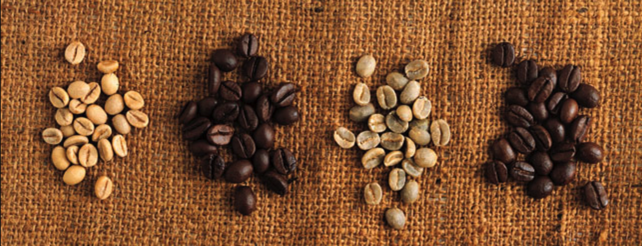Arabica vs. Robusta - The Tale of Two Beans

Arabica (coffea arabica) and Robusta (coffea canephora) are the two most common coffee species. Generally, arabica beans are considered to be superior in quality to robusta beans. Instant and cheap ground coffees are almost exclusively robusta. But don’t assume that just because beans are arabica that they are also high quality. As with anything, there are higher and lower quality arabica beans available. We’ve put together a list of the major differences between the two coffee species to help you learn more about our beloved beans.
• Growing Conditions •
Most arabica is shade grown in higher altitudes on mountain tops and requires temperatures between 59°F - 75°F. They need 4 years to yield crop and require a lot of TLC to reach their full potential. Robusta plants only need 2 years to mature and produce more coffee per acre. Basically, robusta is more robust! Robusta can be grown at sea level to 2,600 ft, requires warmer temperatures (76°F - 96°F) and a little more rainfall than arabica. It’s easier to grow since the plants can be cultivated at lower altitudes and can withstand harsher conditions due to their high caffeine content, which acts as a natural insect repellant. These differences in growing conditions result in lower costs to produce robusta, making the price of arabica considerably higher.
• Taste •
The differences in growing conditions listed above result in arabica and robusta having very different flavor profiles. The longer growing period of arabica produces more oils which give them highly complex flavors and layers. Arabica beans have fruity aromas and contain more sugar, which produces a sweeter taste. A lot of robusta coffee has a burnt, rubbery taste. It’s possible to get away from the unpleasant flavors with higher quality robusta beans. These are used for espressos since robusta makes a good crema.
• Caffeine Content •
On average, robusta beans contain twice as much caffeine as arabica beans. The higher caffeine content is usually associated with the bitter flavor of most robusta coffee. If you are looking to limit your caffeine, but still want to get your coffee fix, stick to drinking 100% arabica beans. On the other hand, if your sole purpose for drinking coffee is the energy jolt, robusta is the one for you. Some coffee roasters have made it their primary goal to provide highly caffeinated robusta beans to their loyal customers.
We hope that this post helped you learn a little more about the differences between the two beans. Don’t get too caught up in the arabica vs. robusta argument. Drink what you like and what makes you feel good. Maybe that means a little bit of both!
♥ Peace Love and Coffee, Joan & David
Read more about our company on www.earthbeancoffee.com. Follow our coffee adventures on Instagram & Twitter @earthbeancoffee and on Facebook.